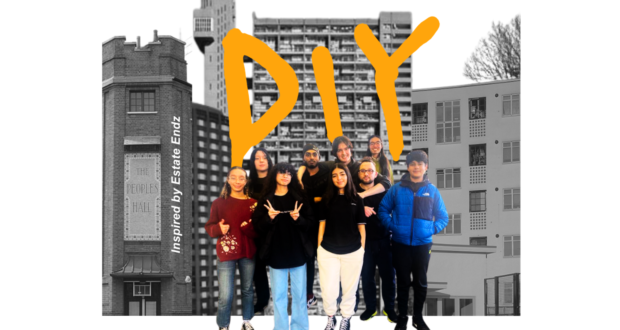An entertaining, educational and immersive exploration of the history of social housing that insightfully articulates the practical and emotional challenges of achieving social change.Summary
Rating
Good
DIY is a multi-layered immersive show from SPID youth theatre that dramatises the heritage of West London’s fight for housing justice. It offers a deep dive into the history of estates and social housing in the local area, whilst importantly addressing its human impact. And it’s DIY indeed, as the performance has been developed entirely by young people aged from 13-25, researching, devising, performing – even writing poetry around the subject, while working in conjunction with award winning artists.
Performed book in hand, this is an evolving show, presented confidently by enthusiastic young actors who take the opportunity to really own their history, whilst giving visibility to an often disregarded local community and articulating a complex array of challenging social and emotional issues.
Firstly though, location, location, location! It’s brilliant to see this grassroots work given validity through its staging not only at local housing estates, but now at the Bush Theatre’s Script Library. The Script Library is not an easy space to work with, but the audience is made welcome in the intimate room and the young creatives have thoughtfully designed the props and set to ensure flexibility both here and on tour. Images of the locality and its stories are integrated onto cardboard boxes that can be rearranged to suggest changing accommodation and shifting time periods, whilst weaving in multiple levels of understanding. At one point we’re encouraged to examine the name labels of the buildings – ‘Grenfell Tower’, ‘Trellick House’ – where letters are circled to pull out the word ‘homes’: a poignant reminder that these are so much more than buildings.
From scriptwriting to staging, interviewing to historical investigation, the team have clearly immersed themselves in the subject, made apparent as they carefully consider multiple stories. We’re told of the post war housing crisis that has led to eviction and demolition protests, but which has also inspired movements that challenge the modern managed decline of estates. They enact personal conflict and resolution in order to explore arguments and find conclusions. They use recorded verbatim soundtracks to give context and history, and self-penned poetry that gives us insightful expression of their personal responses. It’s inspiring to see how agency is put into their hands through this dramatic process, as they are trusted to research, manage and interpret the content of the show, with excellent results.
Buildings and heritage are discussed as being a crucial part of the community’s essence and heritage, and DIY gives presence to the voices of actual residents, as the youth group document their accounts of local history. This is an admirable community outreach process, which cleverly bonds disparate people to validate their lived experience and ensure it is not lost or dismissed. Intergenerational perspectives are paralleled with accounts from documented historical studies of social housing, and additional audio recordings supplement the script, giving texture
At the core of the production is a determination to achieve positive social change by becoming informed, and sharing stories. The interactive form of the show echoes the manifesto of collaboration and social understanding as there are a number of moments where the performers reach out: questions are asked of individuals in the audience; snacks are shared; we’re invited to repeat mantras. It’s an open, bonding exercise and quite moving.
The post-show Q&A was an opportunity to celebrate the achievements of the group, but also to recognise the impact of the work. Significantly, one of the audience attendees who lives on the estate commented on the positivity of the production and how it really made their issues feel heard. Solidarity achieved.
Written by SPID’s Artistic Director Helena Thompson in collaboration with SPID’s youth programme ‘Living History’ Participants.
DIY will also be performed at the Victoria and Albert Museum on Saturday 10 February.
You can find out more about SPID here.
 Everything Theatre Reviews, interviews and news for theatre lovers, London and beyond
Everything Theatre Reviews, interviews and news for theatre lovers, London and beyond



